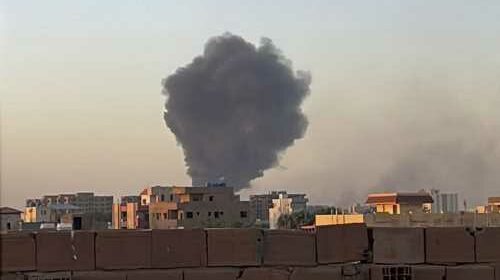'Dangerous' biohazard threat for Brits after Sudanese rebels seize lab containing polio in war-torn Khartoum, warns WHO | The Sun

SUDANESE fighters have seized a major biolab containing polio, cholera and measles samples in an "extremely, extremely dangerous" situation.
World Health Organisation (WHO) chiefs have sounded a major alarm after a militia group seized the lab in the capital Khartoum.
WHO chief Dr Nima Saeed Abid said: "There is a huge biological risk associated with the occupation of the central public health lab… by one of the fighting parties."
The fighters have seized the National Public Health Laboratory and scientists looking after the pathogens cannot access the lab.
"This is the main concern: no accessibility to the lab technicians to go to the lab and safely contain the biological material and substances available," said Mr Saeed Abid, speaking via video link from Sudan.
Scientists have been for years warning about the danger of a virus or pathogen being released from a poorly managed biolab – especially in the wake of the pandemic.
READ MORE ON SUDAN
Desperate mission to rescue Brits from Sudan ‘worse than Afghan airlift’
Gunfire inches towards Brits in Sudan as thousands told they may not be rescued
The situation in Sudan is devolving into chaos amid fighting between warring groups – with the capital being devastated by gun battles and airstrikes.
WHO said the captured facility has samples of diseases including polio, cholera and measles.
And the release of such a pathogen amid the ongoing chaos could be devastating amid the unfolding carnage.
It comes as Britain has launched a daring mission to rescue some 4,000 citizens from the war-torn nation.
Most read in The Sun

Emmerdale reveals exit after 16 years as beloved character quits the village

Corrie fans have same complaint as Aadi takes revenge on Amy’s rapist Aaron

Alex Jones in tears as she interviews Anton Du Beke after Len Goodman’s death

Man who survived smash that killed 3 pals is pictured for first time
The first RAF transport plane carrying rescued Brits took off this morning from a military airfield around 20 miles outside Khartoum.
British forces are trying to operate in a narrow 72-hour ceasefire window brokered by the US.
There is the constant fear that such fragile peace could collapse at a moment's notice and catch Brits in the crossfire.
Teams of special forces are expected to secure safe routes out for UK citizens – before passport holders are then called to the airfield.
Some 1,400 UK military personnel are understood to be involved in the operation – possibly alongside ships from the Royal Navy.
Prime Minister Rishi Sunak confirmed the "large scale airlift" is being undertaken to rescue trapped Brits.
The ceasefire between Sudan's warring generals came into effect on Tuesday.
The country has been rocked by 10 days of urban combat which has killed hundreds, wounded thousands, and sparked a mass exodus of foreigners.
The United States and European, Middle Eastern, African and Asian nations launched emergency missions to bring to safety their embassy staff and Sudan-based citizens by road, air and sea.
But millions of Sudanese are unable to flee what is one of the world's poorest countries, with a history of military coups.
They are trying to survive acute shortages of water, food, medicine and fuel as well as power and internet blackouts.
And the looming biohazard danger adds a further complication.
Scientists warned The Sun Online about the dangers posed by biolabs with poor international standards.
Biosafety expert Dr Richard Ebright said the explosion in high risk labs has led to a "deadly international arms race".
The professor of chemistry and chemical biology at Rutgers University warned the scramble to build the dangerous labs is "accelerating worldwide".
And a key report, penned by Dr Filippa Lentzos and Dr Gregory D. Koblentz, warned the number of high risk labs is "rapidly increasing".
They warned warned international standards are woefully inadequate to properly police the major threat posed by the labs.
"More countries are building high-containment laboratories, developing dual-use biotechnologies, and conducting risky research with pathogens," the authors said.
"The dangers posed by an accidental or deliberate release of a pandemic-capable pathogen means that strengthening international oversight is critical."
Source: Read Full Article


